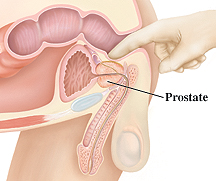Prostate Cancer Screening
Problems with the prostate (a gland in the male reproductive system) become more common as a man ages. These problems include prostate cancer, a common cancer in men. This cancer can often be cured or controlled, especially if it is found and treated early. Screening tests help detect prostate cancer before it causes any symptoms.
Prostate Cancer
Cancer is an uncontrolled growth of abnormal cells. These cells form in one area and can spread through the body. Prostate cancer causes no symptoms in its early stages. In fact, urinary problems are more likely to be symptoms of another condition.
Risk Factors for Prostate Cancer
The things that can increase a man's chance of developing prostate cancer are called risk factors. These include:
-
Age. The risk of developing prostate cancer increases as you grow older.
-
Family history. If your father or brother has had prostate cancer, your risk of developing it is higher.
-
Race. African American men are more likely than other men to develop prostate cancer. They are also more likely to die of prostate cancer than other men with this disease.
Screening for Cancer
Screening for prostate cancer is done with a physical exam and blood tests. These tests can help determine whether it is likely that you have cancer. The American Urological Association recommends that men with risk factors begin yearly screening at age 40. Men with no risk factors are offered yearly screening at age 50.

The DRE takes just a few seconds.
Prostate cancer screening tests include the digital rectal exam (DRE) and a lab test called the PSA test. If the DRE or PSA suggests that cancer may be present, other tests are then done. These tests help show whether a man has prostate cancer.
Medical History and DRE
During your medical exam:
-
Your healthcare provider will ask about your personal and family medical history. He or she will also ask about any symptoms you have.
-
Your provider will ask about any medications you take, including herbs and supplements.
-
If you're having problems with urination, your provider may order a urinalysis to check for a urinary tract infection.
-
Your provider will perform a DRE. This involves inserting a lubricated gloved finger into the rectum. Because the prostate is next to the rectum, many prostate abnormalities can be detected with this exam.
The PSA Test
PSA (prostate specific antigen) is a protein produced by prostate tissue. The PSA level is measured with a blood test. The result helps assess the likelihood of prostate cancer. To screen for prostate cancer, the PSA test is done once a year.
Evaluating the PSA
A high or rising PSA level suggests that prostate cancer may have formed. A lower PSA level indicates that cancer is less likely. In addition to the PSA level, your doctor may look at:
-
The ratio of free PSA (PSA that is not bound to a certain protein in the blood) to total PSA.
-
The PSA velocity (how fast the PSA level is rising).
-
The PSA density (the relation of the PSA level to the size of the prostate).
Factors That Affect PSA
Many factors can affect PSA levels. Some, such as age, BPH, and prostate cancer, are ongoing. Others, such as prostatitis or recent sexual activity, have only a temporary effect on PSA. Your healthcare provider can explain how these factors may affect the timing of the PSA test and your results.
Further Testing
Abnormalities found with DRE may not be tumors. And a high PSA level doesn't always mean cancer. More tests need to be done. After looking at the results of your screening tests, your doctor may recommend other tests.
Biopsy
This test involves taking tissue samples from the prostate. With transrectal ultrasound (TRUS) as a guide, a thin needle is used to remove samples. The tissue samples are then analyzed in a lab to check whether there are cancer cells and, if so, how likely they are to grow quickly.
Imaging Studies
If cancer is found, imaging studies may be done to check for its spread. Bone scans(x-rays) check whether cancer has spread to bones. CT and MRI can detect tumors in bones and soft tissues.












